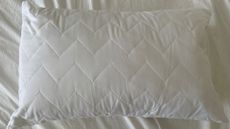This 8-question wellness test can help prioritise your goals for 2025
Take our wellness test to find out what you can do to boost your health and keep your body and mind in shape this year


Do you know which activity has been found to increase your anxiety levels, or which lifestyle factor carries the biggest breast cancer risk? Have a go at our wellness test to help improve your knowledge and alter your lifestyle habits this year.
When it comes to New Year's resolutions, we often think we must 'go big' to see a difference. Yet little alterations, like eating more fruit and vegetables and a quick early morning walk, can be more sustainable and improve long-term health.
Paying attention to your wellness IQ is a great way to keep your body and mind in peak condition across the seasons and set achievable goals for the upcoming year.
Wellness test
1. Can vitamin C supplements help prevent colds?
- A: No, that’s a myth
- B: No, but they can lessen the severity if taken at first symptoms
- C: Yes, if the correct dose is taken
- D: No, but they can reduce the severity of colds when taken year-round
Answer: Vitamin C is a potent antioxidant, and more of it is required when you’re suffering from a cold to help combat the oxidative damage caused by infection, says dietitian Dr Sarah Schenker. "Taking 200mg at the first sign of a cold has been found to reduce the severity of the infection." (B)
Always consult your doctor or a registered dietitian if you're looking to make major changes to your diet.
2. Walking how many steps a day has been found to reduce risk of death by 41%
- A: 10,000
- B: 20,000
- C: Less than 5,000
- D: Between 5,000-10,000
Answer: A study published in JAMA Internal Medicine found that, for women aged 62 and over, taking 4,400 steps daily was associated with a 41% lower risk of dying prematurely than those who walked 2,700 steps or fewer.
The more steps walked the more the risk is reduced, levelling off at 7,500. "While 10,000 steps is ideal, this shows it’s always better to do something rather than nothing," says women’s health and fitness coach Baz Moffat. (C)
Sign up for the woman&home newsletter
Sign up to our free daily email for the latest royal and entertainment news, interesting opinion, expert advice on styling and beauty trends, and no-nonsense guides to the health and wellness questions you want answered.
While outdoor walks are the best for mental and physical health, offering a breath of fresh air along with movement, you can try indoor walking workouts to do more steps at home.
3. You wake at night and can't get back to sleep, what should you do?
- A: Read a book
- B: Watch TV
- C: Drink chamomile tea
- D: Lie in bed resting
Answer: "We’re often told to get up or read a book," says Dr Guy Meadows, clinical director of the Sleep School. "However, your internal body clock may log this and make it a habit, causing you to wake the next night thinking it’s time to read."
Instead, stay in bed and practise mindfulness to improve your sleep hygiene. "Focus on your breath – in and out," says Dr Meadows. "The goal isn’t to get back to sleep, but to let go of any anxious thoughts." (D)

Eating more foods high in vitamin C throughout the year, such as tomatoes, oranges, and red peppers, may also be a good idea to ward off colds.
4. Which contains the most amount of saturated fat?
- A: 100g pork
- B: 1 tbsp olive oil
- C: 100g trout
- D: 100g steak
Answer: "Trout contains 1.5 times the amount of saturated fat found in steak," says Dr Schenker. "Olive oil is also high, with 1 tbsp containing about the same as a pork chop. The debate continues as to whether saturated fat is as bad for us as once thought – dietitians tend to agree that the health benefits of trout (with its high omega-3 content) and olive oil (with its heart-healthy mono-unsaturated fats) outweigh any risk from the saturated fat content." (C)
5. Which of these did a study find could increase anxiety in sufferers?
- A: High-intensity exercise
- B: Relaxation exercises
- C: Green tea
- D: Using heart-rate monitors
Answer: A Penn State University study found that practising relaxation techniques can actually trigger anxiety in sufferers. "When people try too hard to relax, the opposite can occur," says Dr Joanna Silver, lead psychological therapist at Orri.
"It can be more helpful to allow the mind to wander and accept anxious thoughts instead. With practice, people can learn to accept feeling anxious without engaging with it." (B)
6. Which of these lifestyle habits carries the biggest breast cancer risk?
- A: Smoking
- B: Being overweight
- C: Drinking alcohol
- D: Hormone replacement therapy
Answer: All are linked to an increased risk, reports Breast Cancer UK, but weight gain resulting in increased body fat is thought to be the biggest threat. "Being overweight and adult weight gain are widely recognised risk factors for breast cancer in post-menopausal women, mainly due to increased levels of circulating oestrogens," says Thalie Martini, CEO of Breast Cancer UK.
"The more weight you gain over your adult life, the higher your risk of breast cancer after menopause." A BMI of more than 30 is considered obese. (B)
BMI takes your weight - including muscle mass, which weighs more than fat - into account. Speak to your doctor if you have concerns about your weight.
7. What's the single worst thing for your posture?
- A: Slouching
- B: Being inactive
- C: Lifting heavy objects
- D: Constantly checking smartphones
Answer: "While slouching and looking down at phones and screens isn’t great, if we’re active, fit and healthy, we’re far more likely to withstand slouching without it causing a major problem," says Tim Allardyce, clinical director at Surrey Physio. "It’s when we’re out of shape and spending the day stationery that things really start to seize up." (B)
Try some simple mobility exercises to stretch out if you find yourself sitting down for most of the day, with many routines available on your pick on the best stretching apps.
8. What's the best diet for good mental health?
- A: One rich in omega-3 fats
- B: A diet low in sugar and refined carbohydrates
- C: The Mediterranean diet
- D: Eating everything in moderation
Answer: "Trying too hard to get our diet 'right' can actually be counterproductive," explains Dr Silver. "People run the risk of becoming obsessed with what they eat and don’t eat, and that in turn can lead to its own mental health problems."
Instead, she suggests trying "to listen to your body and let it have a little of what it wants. Cutting out certain food groups and eating a restrictive diet makes someone more likely to binge on forbidden foods." (D)
Faye M Smith is an award-winning journalist with over 20 years experience in the magazine industry. Her continued work in the area of natural health won her the coveted title of the Health Food Manufacturers’ Association (HFMA) Journalist of the Year Award 2021. Currently Group Health Director across several magazines including woman&home, Woman, and Woman’s Own, Faye specialises in writing about women’s health, especially menopause, relationships and mental health.
- Grace WalshHealth Channel Editor
-
 Beyoncé's interior designer's pans are "art for your kitchen" - here's how to get your hands on them
Beyoncé's interior designer's pans are "art for your kitchen" - here's how to get your hands on themThe Our Place X Brigette Romanek Collaboration offers a limited-edition espresso hue on the Perfect Pot and Always Pan. It's style and substance done right.
By Laura Honey Published
-
 I slept on 'The Perfect Pillow' for one year - is it worthy of the title?
I slept on 'The Perfect Pillow' for one year - is it worthy of the title?The Perfect Pillow by SIlentnight comes with three different firmness options. You can customise it to your heart's desire, which makes it a dream to sleep on.
By Laura Honey Published